Follow Your Different
087 9 Lies About Work w/ Ashley Goodall
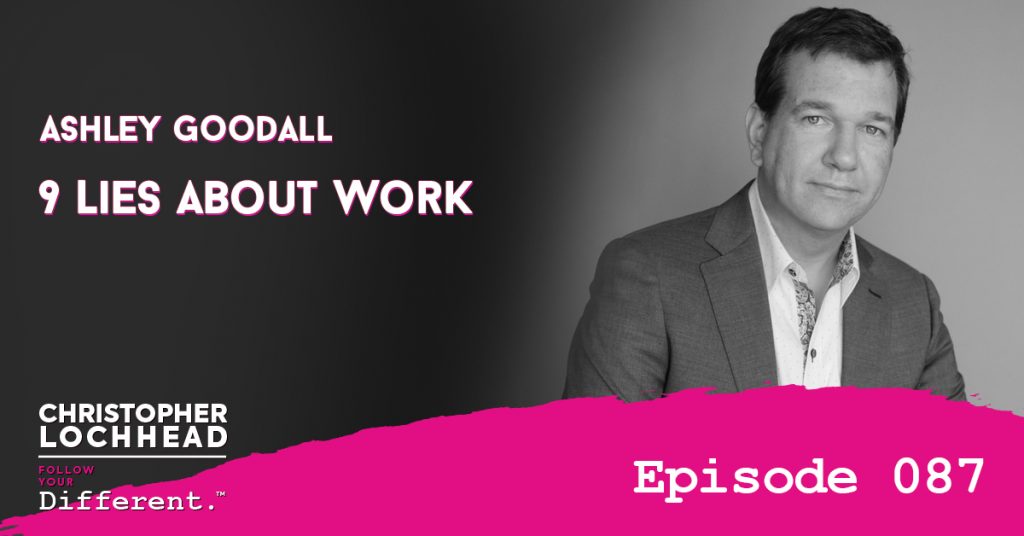
Podcast: Play in new window | Download (Duration: 52:55 — 48.6MB) | Embed
Subscribe: Apple Podcasts | Spotify | Pandora | RSS | More
The author of a ground-breaking new book called Nine Lies About Work, Ashley Goodall, joins us today for a fun, smart and unpredictable conversation about work and life. Lochhead and Goodall discuss what’s wrong with work and what to do about it, work-life balance and nurturing the human spirit at work.
Nine Lies About Work
Ashley Goodall is SVP of Leadership and Team Intelligence (LTI) at Cisco. He built this new organization to focus entirely on serving teams and team leaders. Through this, they are able to research and study the most challenging questions about work.
His work at Cisco focuses on defining what is special about the best teams and how does one create the best team for the company. Other than this, he is also the co-author of Nine Lies About Work: A Freethinking Leader’s Guide to the Real World.
“There are very few things in life that you can’t or shouldn’t smile at. At some point, the more serious the topic, the more important it is to find little moments of levity and humor.” – Ashley Goodall
Work-Life Balance
Ashley points out his opinions about achieving work-life balance and why it is such an unapplicable paradigm in today’s world. Christopher shared how this mindset creates two persons: one that is working and another one, who is living his life.
“The implication of that is, all that stuff in work is bad and all the stuff in life is good. Your job — in order to lead a fulfilled life — is to have enough sugar to sprinkle into all that bitterness of work.” – Ashley Goodall
In this mindset, we are taught that life is the antidote to work — but that is a huge misrepresentation of life. Further, Ashley says that work-life balance is such a disservice to the wonderfulness of work. It mutes employee curiosity of finding out what work will be like if one is high-performing or say, growing and making a huge impact.
“If the prescription is to take over the toxicity and balance it with life, you’ll never get to ask those questions, that is such a shame.” -Ashley Goodall
Language, Love, and Life
Ashley shares a wide array of stories and opinions in this podcast. He poses his standpoint on giving weight to context, as opposed to just taking words as it is.
He further gives advice on how to grow the human spirit in the workplace. The discussion turns into an interesting discussion about love.
To hear more about the nine lies about work and more relevant information from Ashley, download and listen to the episode.
Bio:
Ashley Goodall is an executive, leadership expert, and author, and has spent his career exploring large organizations from the inside.
He looks for lessons from the real world that help people and teams thrive. Further, he focuses on what makes work a more human place for all of the humans in it.
His first experience of teams and leadership were as a student musician and conductor. He was fascinated by the unspoken understanding between people playing together and carried this fascination into the corporate world.
He currently serves as the Senior Vice President of Leadership and Team Intelligence (LTI) at Cisco. It is a new organization built to focus entirely on serving teams and team leaders, and which aims to reveal the answers to some of the most challenging questions about work. What is special about the best teams?
Why do we follow one leader and not another? How can we make more teams like our best teams and more leaders like our best leaders?
The new approaches he has pioneered address everything from performance management to feedback, to team activation technology, to real-time team intelligence, to social network mapping, to strengths-based leadership—and together this challenge much of the conventional wisdom of work today.
Ashley is the co-author, with Marcus Buckingham, of Nine Lies About Work: A Freethinking Leader’s Guide to the Real World (Harvard Business Review Press, April 2019), and of two cover stories in the Harvard Business Review: The Feedback Fallacy, (March/April 2019), and Reinventing Performance Management, (April 2015).
Links:
CISCO Executive Bio – Ashley Goodall
We hope you enjoyed this episode of Follow Your Different™! Christopher loves hearing from his listeners. Feel free to email him, connect on Facebook, Twitter, Instagram and subscribe on iTunes!
086 Grumpy Old Geek Stuff: Jason DeFillippo
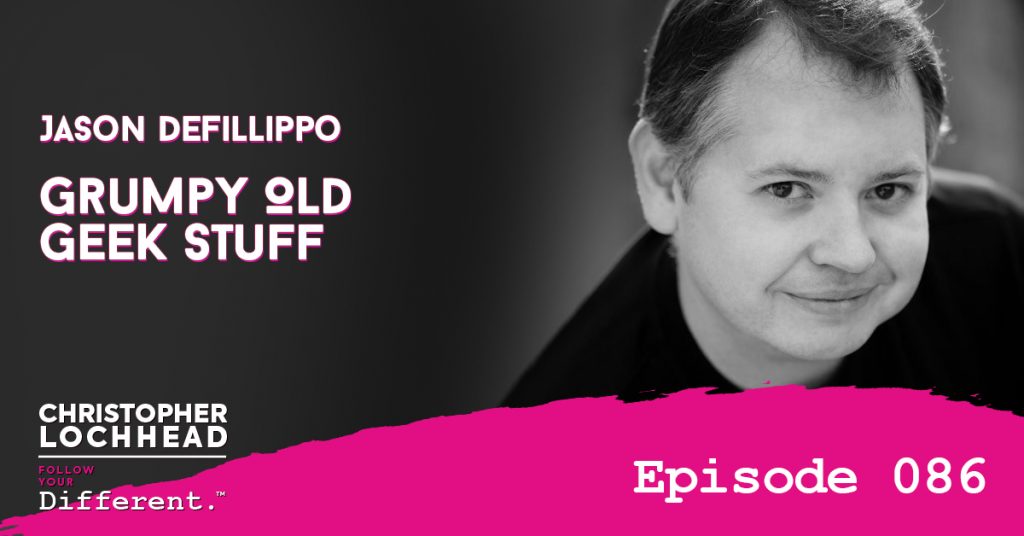
Podcast: Play in new window | Download (Duration: 1:19:14 — 72.7MB) | Embed
Subscribe: Apple Podcasts | Spotify | Pandora | RSS | More
He’s back! Podcast legend and co-host of Grumpy Old Geeks podcast, Jason DeFillippo joins us for another dynamic conversation about the world of podcasting. They also touched a few recent topics about “who should be allowed at Disney World,” “why FaceApp is scarier than Facebook and Instagram” and many more!
Podcasting Is Alive!
In episode 006, Jason DeFillippo joined Christopher Lochhead to discuss a lot of random but viral topics. In this episode, DeFillippo did not disappoint as he shared his views on a lot of topics, firstly, about podcasting.
“Those people are like you and I, we stick around and we get through the tough times. We’re not here to make a quick buck. We’re not here to turn a profit on 10 episodes or 6 episodes, on an iPhone on a library. You gotta put in the work.” – Jason DeFillippo
DeFillippo shared his comments about news writers who dub podcasting as dead. In unison, Lochhead shared statistics to prove that podcasting is, indeed, growing. They exchanged stories as hosts, such as their experiences with booking and rejecting guests and advertisers.
“I’m a craftsman, I’m an artist. I love to make new things. I love to try new things, that’s why I love podcasting. There’s always something new to learn but people who come into this, all they want to do is make money and that’s almost everybody that’s coming in now.” – Jason DeFillippo
Viral Issues: Where do you stand?
For a breather, Lochhead cites some viral stories and takes the standpoint of DeFillippo.
Lochhead cites the Disney rant — where a mom’s rant about long queues and childless millennials in Disney World, goes viral. They also discussed Apple’s Siri recordings apparently sent out to contractors for analysis. DeFillippo believes it will not hurt the company in any way, just like how Facebook stock prices rose up after paying fines to the government.
In relation to Security threats raised by Morgan Wright in Episode 84, about deep fakes and Russian FaceApp, DeFillippo brushed these events aside.
“Who cares? This is useless data. These photos? They could get that in the internet already. They care about a lot of other things, but a picture of you? No, ‘cause they’re looking at numbers. They care about your behavior and your demographics and how they can influence you.” – Jason DeFillippo
Moreover, Lochhead and DeFillippo discussed more recent top stories such as Equifax paying $125 for filling up a simple form and for bizarre stories, about a woman cuddling a giant pet snail. They sure did had fun having a rundown on these top and viral stories.
To hear more about podcasting, viral stories and more relevant information from Jason, download and listen to the episode.
Bio:
Jason is a full-time podcast producer and editor for The Jordan Harbinger Show as well as the Creator and Co-host of the Grumpy Old Geeks Podcast.
Jason has been building websites since the early days in 1994 for clients that range from small businesses to million dollar websites for blockbuster films to his own start-ups.
In 1994 he created the groundbreaking website Spewww which was nominated for a Webby in the first year the awards were held in 1998.
In 1995 a new media company in Santa Monica moved him out to Los Angeles to build the first website for Epson America.
Since then Jason has launched over 250 websites for major corporations like Paramount Pictures, Sony, Warner Brothers, and Disney.
He also created the two time SXSW Weblog Award-winning Blogrolling service as well as co-founded the global blog network Metroblogging.
He has worked at several startups in San Francisco including Technorati and 8020 Media, the publishers of JPGMagazine.com, and statistical aggregator Metricly.
Links:
Some of the topics covered:
Childless millennials have no place at Disney World and should be banned, tired mom rants
Siri recordings ‘regularly’ sent to Apple contractors for analysis, claims whistleblower
‘Deepfakes’ Trigger a Race to Fight Manipulated Photos and Videos
Why you probably won’t actually get $125 from the Equifax settlement
Woman inseparable from giant pet snail that she loves cuddling on sofa
We hope you enjoyed this episode of Follow Your Different™! Christopher loves hearing from his listeners. Feel free to email him, connect on Facebook, Twitter, Instagram and subscribe on iTunes!
085 Conversations vs Interviews
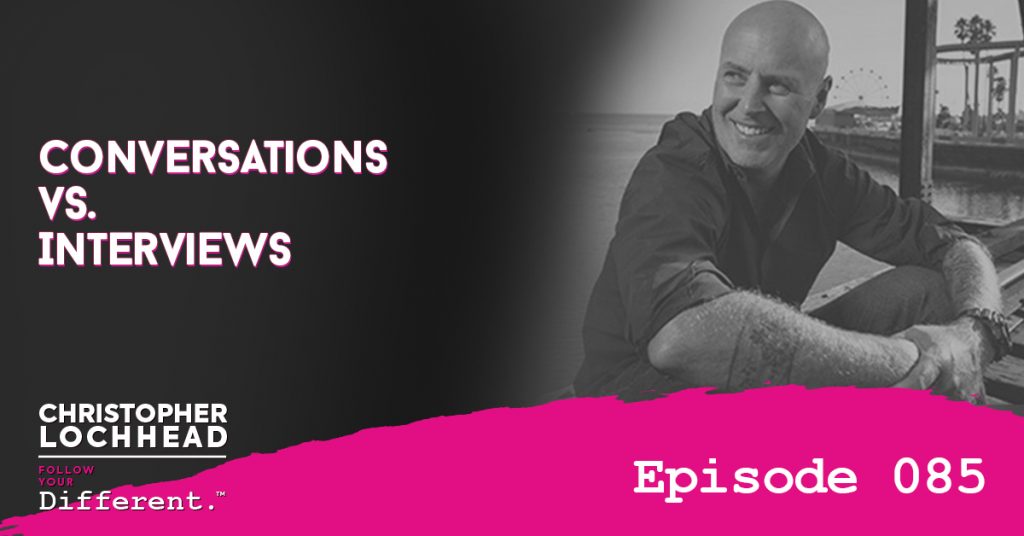
Podcast: Play in new window | Download (Duration: 16:18 — 15.1MB) | Embed
Subscribe: Apple Podcasts | Spotify | Pandora | RSS | More
In this episode, Christopher Lochhead shares some insights about conversations (or dialogue) and interviews. Two gentlemen, a guy who messaged him on Linkedin and actor Tom Hanks, were the inspiration for this episode. Both underscored the difference between real conversation and typical interviews.
Safe, bankable and professional
Tom Hanks is one of the most successful and cleanest, most professional, family-friendly actors of all time. His movies have grossed over $5 Billion. He would unlikely get drunk and urinate in a hotel lobby on a press tour — which is why Disney hired him.
To shine a light on our topic, Tom Hanks was recently on Jimmy Kimmel to promote the newest Toy Story. He talked about how Disney enforced strict control over what he can and can not say about the movie.
“Ever wonder why you rarely hear a Fortune 500 CEO say anything interesting? Ever wonder why politicians don’t really answer questions? High profile people have been taught by lawyers and PR people to ‘bridge back’ to their talking points.” – Christopher Lochhead
Everything is Scripted
As Lochhead observed, many politicians, celebrities and even CEOs say the same thing over and over again during interviews. The reason for this is: it is scripted!
Interviews are almost 100% predictable and inauthentic — from the host looks, clothes to the shots, content, and substance. The whole interview focuses on PR talking points, legal constraints, predetermined narrative. Further, the whole “conversation” is rehearsed in advance.
“Interviews are more like classical music. Conversations are different. They are more like rock ‘n roll; they feel a little more exciting and are free form.” – Christopher Lochhead
Conversations are like rock and roll
Conversations are different, as most of the time, the guest and host go off-script. Interestingly, one guy from Linkedin messaged Lochhead and provided feedback. He mentioned things such as “make it shorter, edit it to cut out the non-essential parts and seems not prepared enough in terms of the questions, seems more like an informal conversation.”
Lochhead further explained that that was not the objective of this podcast. However, he does understand that this style of odd-cast is not for everyone.
“People think out loud. They jam. They go beyond well rehearse lines. As a marketing guy, I’ve understood this for a long time. Conversations are way more interesting than interviews.” – Christopher Lochhead
In this episode, we included some of the feedback we received from listeners about how they would describe the podcast to a friend.
To hear more about conversations vs interviews and more relevant information from Christopher, download and listen to the episode.
Bio:
Christopher advised over 50 venture-backed startups. He is a venture capital limited partner and a former three-time Silicon Valley public company CMO, entrepreneur. In addition, he co-authored two bestsellers: Niche Down and Play Bigger.
After he flunked school, with few other options, Christopher started his first company at the age of 18.
He was a chief marketing officer of software juggernaut Mercury Interactive. Hewlett-Packard, in 2006, acquired that company for $4.5 billion.
Further, he also co-founded the marketing consulting firm LOCHHEAD. Christopher was the founder/CMO of Internet consulting firm Scient. He also served as head of marketing at the CRM software firm Vantive.
Christopher loves his family and friends. He thinks the Ramones are legendary and loves riding the mountains and waves of Northern California.
Link:
Tom Hanks Revealed the Secret of How He Avoids Dropping Toy Story 4 Spoilers
We hope you enjoyed this episode of Follow Your Different™! Christopher loves hearing from his listeners. Feel free to email him, connect on Facebook, Twitter, Instagram and subscribe on iTunes!
084 Security w/ Morgan Wright
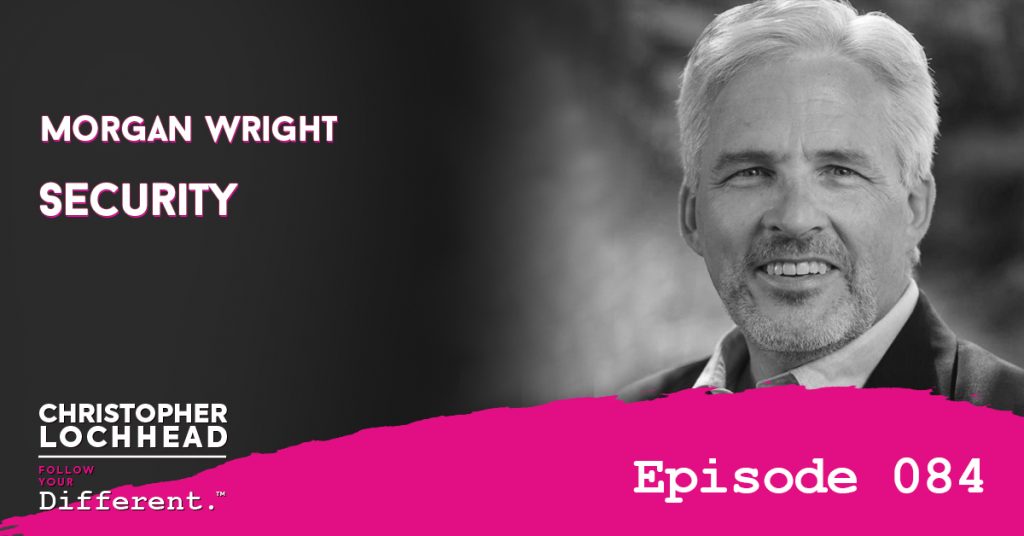
Podcast: Play in new window | Download (Duration: 1:10:56 — 65.1MB) | Embed
Subscribe: Apple Podcasts | Spotify | Pandora | RSS | More
Today’s fun, informative and somewhat terrifying conversation is with Morgan Wright, Senior Advisor in the US State Department on Antiterrorism. Wright, with 18 years of state and local law enforcement experience, shares pressing stories about China, AI and what Russia did with data from FaceApp and some valuable information about quantum encryption.
An uptight, drill sergeant, with no personality…NOT!
Morgan Wright has 18 years of background with law enforcement and is a National Security opinion writer at TheHill.com. Hundreds of television interviews about security featured Morgan. New York Times best-of selling author has quoted him as well.
He had a background with behavioral assessment and damage assessment—which span from different areas of security such as bomb threats, espionage and illegal importation of dangerous drugs. Amidst these descriptions, one would expect that he is an uptight, drill sergeant with no personality, but he is definitely not.
What’s up with Russian FaceApp?
In our previous episode with Tom Siebel, he quoted in his book a statement from Vladimir Putin, which reads “AI is the future, not only for Russia but for all humankind. Whoever becomes a leader of this sphere becomes the ruler of the world.”
Wright agreed with Lochhead on this quote. He said there are two things the U.S. Security is worried about now. The first one is the impact of AI and machine learning and what it can do with this information. The second one is the offensive capability of what is going on with Google, Microsoft, and China and Russia, where they are building their versions of Robocops.
“I started looking out for deepfakes not so long ago, not for this Scarlett Johansson and how you make porn stuff out of it. What if, I can show a video that appeared to be the Commanding General telling his troops to “stand down, hold on a minute” — just long enough for one of our adversaries to launch a strategic attack against us.” – Morgan Wright
More Security Threat
Wright discusses the real impact AI—from a psychological standpoint, distant information standpoint and kinetic standpoint. He further tells us facts about quantum encryption and what makes it troubling for national security.
“We now have to worry about our troops having to fight armies — that are supplied with technology by American companies.” – Morgan Wright
To hear more about security issues and more relevant information from Morgan, download and listen to the episode.
Bio:
Internationally community recognizes Morgan as an expert on cybersecurity strategy, cyberterrorism, identity theft, and privacy.
He is President and Chief Development Officer for RadiusAI.
He currently serves as a Senior Fellow at The Center for Digital Government. In addition
, he is a national security opinion contributor to TheHill.com.
Morgan’s landmark testimony before Congress on Healthcare.gov changed how the government collected personally identifiable information.
He appeared in hundreds of interviews on national news, radio, print, and web. These include CNBC, Fox News, Fox Business, CNN, ABC, NPR, NBC and more. Previously, Morgan was a Senior Advisor in the US State Department Antiterrorism Assistance Program. He is also a Senior Law Enforcement Advisor for the 2012 Republican National Convention.
In addition to 18 years in state and local law enforcement, Morgan has developed solutions in defense, justice, and intelligence for the largest technology companies in the world including SAIC, Unisys, Alcatel-Lucent and Cisco.
He’s a contributing author for the 4th Edition Computer Security Handbook. He has been quoted in 2 New York Times bestsellers—Sharyl Attkisson: Stonewalled and Carmine Gallow: Talk Like TED.
Links:
America’s Enigma problem with China: The threat of quantum computing, TheHill.com
We hope you enjoyed this episode of Follow Your Different™! Christopher loves hearing from his listeners. Feel free to email him, connect on Facebook, Twitter, Instagram and subscribe on iTunes!
083 A Legendary Executive, Sue Barsamian
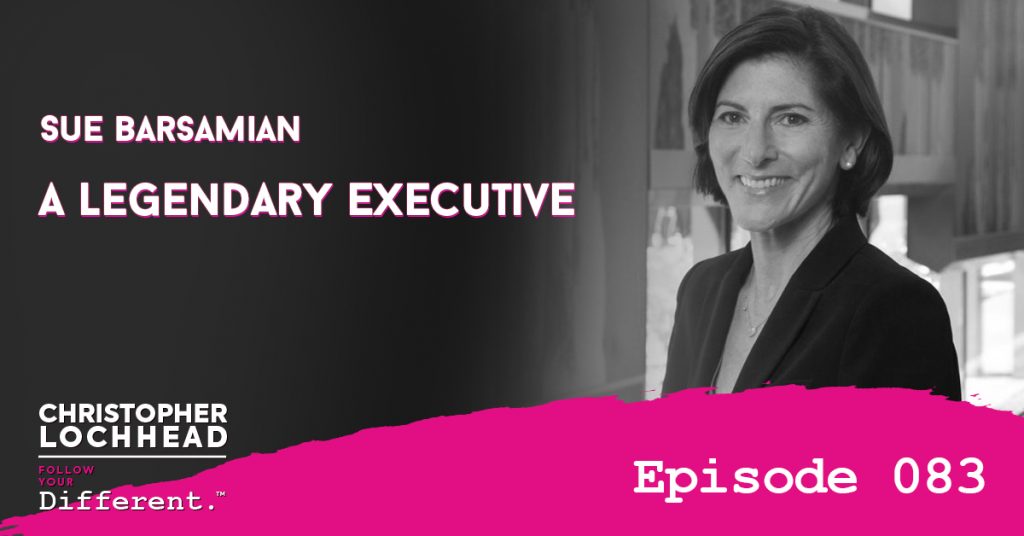
Podcast: Play in new window | Download (Duration: 1:31:33 — 84.0MB) | Embed
Subscribe: Apple Podcasts | Spotify | Pandora | RSS | More
Today, we hang out with an amazing and effective executive, Sue Barsamian. Sue recounts the early beginnings of her career, her challenging job at Mercury Interactive with Christopher and her not-really-a-retirement retirement. In this episode, find out why people dream about having her career.
Challenges After Challenges
Sue has an engineering background that might have contributed to her natural passion for creating, building and solving things. She worked with Christopher at Mercury, which was sold at $5B to HP. She stayed with HP and was assigned to run a billion-dollar cybersecurity business.
“HP gave me a chance to test myself at a scale that I have never tested myself, ‘can you lead 4000 people, can you do 10,000 at P&L?’ Its a different ball game and you’ll never know until you tried it, so that was fun, I had a blast.” – Sue Barsamian
She went ahead to become the head of Sales and Marketing for Software at HP—a role that is unusually given to a single executive. At present, she’s on the board of Symantec ($15B), Box ($2.5) and privately held Gainsight, Xactly. She retired from the operations side of the business but still held a seat at the board.
Keep on Evolving
Sue admits she had a good run in her 36 years in the business. She worked with 8 companies have had around 25 roles overall.
“Nothing in my resume that would say ‘she could do that.’ One of the things about staying in a company is, companies take a risk on people they could stretch and that benefitted me tremendously through my career.” – Sue Barsamian
Other than staying with a company, she stressed the importance of working well with people. She admits that she loves working with different people of different cultures, surviving different situations. She has learned how to understand people and help them become successful
Career Tips to Ponder
Sue Barsamian shares a lot of career tips in this episode. She gives special importance to understanding people and how they have a part to play on the path to success. Giving due credit and acknowledging employees as heroes also do wonders.
“In order to get things done in a company, you need to move mountains that don’t report you. At the end of the day, if you are not about other people’s success, if its all about you and you taking credit to all of your work personally, you’ll crash and burn.” – Sue Barsamian
To hear more about the legendary executive Sue Barsamian and more relevant information from Sue, download and listen to the episode.
Bio:
Sue Barsamian is a seasoned technology veteran with experience in both startups and major public enterprises.
Her background spans in general management, marketing, sales and engineering.
She serves on the boards of Symantec, Box, Gainsight, and Xactly.
Previously she served as the Executive Vice President, Chief Sales and Marketing Officer of Hewlett Packard Enterprise Software, successfully spinning the division out from HPE and merging with Micro Focus International, plc to form the 7th largest software company in the world.
From 2006 to 2016, Ms. Barsamian served in various executive roles at Hewlett Packard including SVP and GM of Enterprise Security Products, the company’s cybersecurity portfolio and SVP of Worldwide Indirect Sales.
Prior to joining Hewlett Packard, Ms. Barsamian was Vice President, Global Go-to-Market at Mercury Interactive Corporation and held various leadership positions at Critical Path, Inc. and Verity, Inc.
She received a Bachelor of Science degree in Electrical Engineering from Kansas State University and completed her post-graduate studies at the Swiss Federal Institute of Technology.
Links:
We hope you enjoyed this episode of Follow Your Different™! Christopher loves hearing from his listeners. Feel free to email him, connect on Facebook, Twitter, Instagram and subscribe on iTunes!
082 Next Time You’re In The Endzone, Act Like You’ve Been There Before
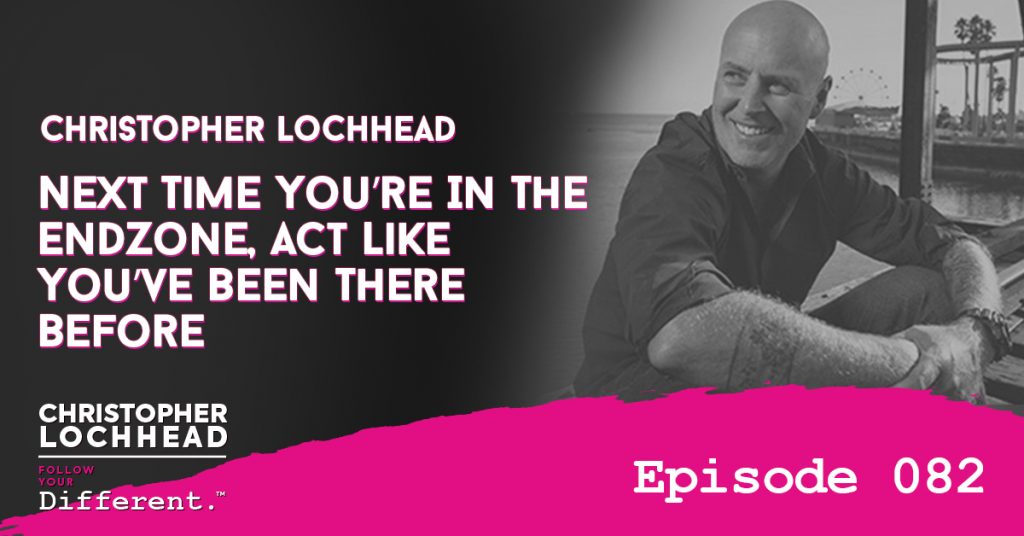
Podcast: Play in new window | Download (Duration: 7:08 — 6.7MB) | Embed
Subscribe: Apple Podcasts | Spotify | Pandora | RSS | More
In this episode, Christopher Lochhead talks about the idea of “faking it till you make it.” He poses a real question about what to do when you finally “make it.” This episode is inspired by Silicon Valley coach Bill Campbell’s quote, “next time you’re in the endzone, act like you’ve been there before.”
Bill Campbell’s Wise Words
On Episode 072, Randy Komisar of Kleiner Perkins joined Lochhead to celebrate the life and lessons of legendary Silicon Valley coach, late Bill Campbell. Guest Randy Komisar, along with colleague Paul Martino of Bullpen Capital, came together to capture Bill in a podcast, called No Bull Podcast. Bill was the coach to Steve Jobs, Jeff Bezos, and countless Silicon Valley legends.
Randy shared a story about Bill, back when he was coaching a football team. There was a time when the team hit a touch down and went mental to celebrate the small victory. According to Randy, Bill did not approve of this and gave the team his wise words: “Hey guys, next time you’re in the endzone, act like you’ve been there before.”
Don’t Do The Victory Noise
Even Lochhead is guilty of celebrating small wins. He recounts a story about surfing as he gets all too excited when he encounters a good wave, often called as “claiming the wave.” His buddy corrected him and told him the message that he sends out to other surfers is that it was “just one” of his best waves. He reminded Lochhead to have the mentality that all of his waves are the best ones.
“You wanna act like you’ve been here before. You wanna act like all your waves are like that” – Christopher Lochhead’s friend, when he does his victory noise
Fake it till you make it
Lochhead candidly shares that he had “faked it till he made it” a number of times in his life. However, Lochhead poses the question, what will you do when you finally make it?
“Act like you’ve been there before, act like it’s something that happens all the time.” – Christopher Lochhead
Further, Lochhead reminds that when we’re pushing ourselves to the next level, we have to act in our own minds and in our behavior. We have to always think that we are the “Whoah-Man or Whoah-Woman.” It’s always nice to celebrate wins, but ideally, it is best to do it privately.
“You have to prepare yourselves so you’ll have the least amount of faking as possible and when in you’re in the situation and something happens, just roll it.” – Christopher Lochhead
To hear more about how to act next time you’re in the endzone and more relevant information from Lochhead, download and listen to the episode.
Bio:
Links:
072 Why Steve Jobs, Jeff Bezos & many others turned to “The Coach” Bill Campbell
We hope you enjoyed this episode of Follow Your Different™! Christopher loves hearing from his listeners. Feel free to email him, connect on Facebook, Twitter, Instagram and subscribe on iTunes!
081 American Immigrant Dreamer Entrepreneur, Diego Corzo
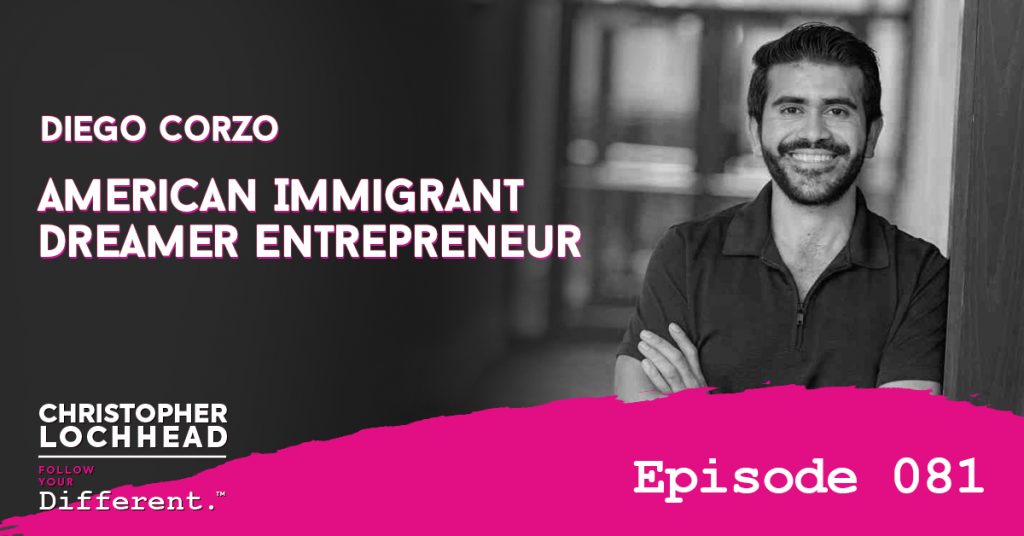
Podcast: Play in new window | Download (Duration: 59:25 — 54.5MB) | Embed
Subscribe: Apple Podcasts | Spotify | Pandora | RSS | More
Young immigrant and entrepreneur dreamer Diego Corzo joins us today in an insightful conversation about entrepreneurship, investing and achieving dreams in a different country. This episode takes the theoretical discussion about the immigration debate in the US and makes it real through Diego.
Being an Undocumented Immigrant
Diego Corzo entered the US with his family when he was nine. He understood the implications of being undocumented when he applied for a driver’s license. He got denied because of his status. These obstacles continued when he found out he was not eligible for any financial grants or student loans.
“I saw the sacrifices that my parents had, from not speaking English to finding work. My mother, from working in a bank, she was cleaning toilets and houses, without having a day off for a long while.” – Diego Corzo
He was a straight-A student at Florida State University and was working part-time and doing some internships with small business and non-profits organizations. He was handpicked by some companies for work after graduation but unfortunately, he does not have a work permit.
Windows of Opportunity
After these obstacles in finding work to fund his schooling, he conducted research on Obama’s Deferred Action for Childhood Arrivals (DACA) and found out he can start a company under LLC set-up. He then registered an IT consulting company with a colleague and took in as clients the small business and NGOs.
“I always had the mindset that no matter what happens, there is always a way here in the United States. As my dad always says, ‘The US is a land of opportunities and its up to us to find it’.” – Diego Corzo
Back in 2017, Diego also posted a commentary to President’s Trump, as he plans to remove DACA. His post went viral and was able to reach some Dreamers like himself. Dreamers are defined as immigrants who entered the US below 16 years old, have finished high-school and have zero criminal records.
Celebrating the Good Life at Age 28
Part of being viral, he was able to meet some millionaire entrepreneurs from the mastermind group, Gobundance. Although Diego started with 25k net worth, these men saw the potential in him and pledged to mentor him to become a millionaire himself. Diego, at 28 years old, now earns 10x of his initial net worth and owns 19 doors in 13 properties.
“When I shared the story, I’m sort of breaking the paradigm. They think that undocumented immigrants don’t pay taxes. They just take jobs and they dont really support the community.” – Diego Corzo
At present, Diego is into real estate investing and is a financial freedom advocate, especially targeting Dreamers like himself.
To hear more about being an American immigrant Dreamer and more relevant information from Diego, download and listen to the episode.
Bio:
Diego Corzo is a 20-something, Peruvian living in Austin, Texas.
He founded FreeBy26.com to help millennials realize that they don’t have to settle to what society expects.
Diego graduated from Florida State University in 2012 and moved to Austin, TX to work as a software developer for an IT Company.
In his spare time, he started learning as much as I could about financial literacy and the habits of wealthy people.
He became interested in real estate as began to explore different ways to increase his income.
He bought my first property when he was 23.
Fast forward 3 years, he now owns 8 properties which are the source of his passive monthly income.
Ultimately, his goal is to be financially free before he turns 27.
He shares more about his struggles, successes, and mindset through his journey, through his website.
Links:
We hope you enjoyed this episode of Follow Your Different™! Christopher loves hearing from his listeners. Feel free to email him, connect on Facebook, Twitter, Instagram and subscribe on iTunes!
080 B2B & B2C Entrepreneur Strava CoFounder Mark Gainey
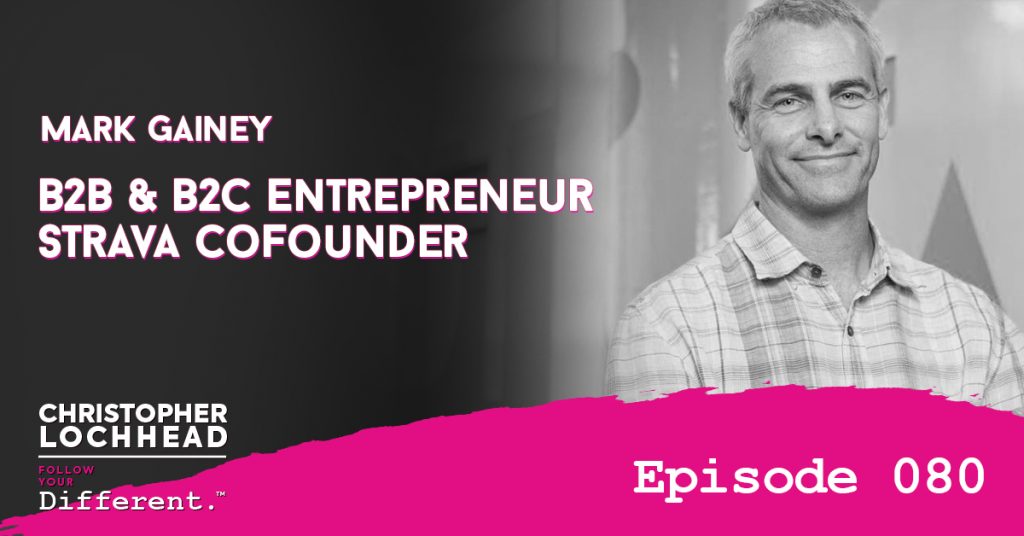
Podcast: Play in new window | Download (Duration: 1:50:26 — 101.2MB) | Embed
Subscribe: Apple Podcasts | Spotify | Pandora | RSS | More
In this episode, Mark Gainey, a serial entrepreneur with big-time success B2B and B2C, joins us for another insight-packed conversation. He is the co-founder and chairman of Strava, the athlete’s social network. Today, he talks about entrepreneurship and success, despite major setbacks in his life.
The Virtual Athlete’s Locker Room
The Swedish word for strive is strava, which is defined as “to make great efforts to achieve or obtain.” This is perfect for a team of individuals who have the ambition and attitude to achieve more. Strava’s mission is to build the most engaged community of athletes in the world.
Co-founders and former college colleagues Mark Gainey and Michael Horvath dreamt about this company way back in 1995. They had the concept of creating a virtual locker room and they called it “Kana Sports.”
“We had this concept at the back of our minds, how Kana sports morphed into Kana communications, we had a great time building that, no regrets.” – Mark Gainey
From B2B to B2C
Mark was previously the CEO of Kana Communications which went public late 1999. With a market capital of 11 billion USD and an upcoming new CEO at that time, Mark found himself moving to a different chapter in his life after.
“I distanced myself in a pretty meaningful way. I often joked to people, if you give your child up for adoption, don’t stay living in the house.” – Mark Gainey, after IPO of Kana Communications
Mark further shares his experiences working in a B2B setting, as a CEO and now B2C setting, as a stockholder.
18 Surgeries in 51 years
One of Strava’s irony is they serve the world’s cyclists, but Mark quips that he must have been one of the worst ones on the planet. For one, he had been in a major biking accident which required 11 surgeries. These surgeries are on top of other surgeries from skiing accidents and car accidents.
“Nobody is dying anytime soon but it is a test. You just get back to the saddle. You learn and say okay now I can have three more runs, good to play some other day.” – Mark Gainey
Mark continues narrating his accident and further says that when he is inactive, he feels like he is a different person. Mark shares that ultimately, this is their goal at Strava: to forget trying to push people to go fast and perform well, just encourage them to engage in activities and sweat at least once in a day.
“I think thats the balance. As much as I know that I take the risk everytime to go out there but the idea of not doing that, that is what would kill me.” – Mark Gainey
To hear more about B2B to B2C entrepreneurship and more relevant information from Mark, download and listen to the episode.
Bio:
Mark Gainey is a serial entrepreneur, co-founder, and Chairman of Strava – the social network for athletes.
Mark co-founded Kana Communications Inc. (Kana Inc.), in January 1996 and served as its Chief Executive Officer & President from January 1996 to June 1999.
He has been building successful companies for nearly 20 years. Prior to Kana, from April 1991 to September 1995, Mark Gainey served as an Associate with TA Associates Management, L.P. (TA Associates, Inc.), where he focused primarily on technology and business services investments.
Mark served as President and Chairman of SWK Holdings Corporation. Further, he served as the Chairman of the Board of Directors of Kana Communications Inc., from July 1996 to July 2000.
In addition to these, he has been a Director of Clari Inc. since April 2014.
Mark serves as a Director of TA Associates, Inc.
He served as a Director of GlobalSight Corporation, AlterG, Inc. and BoardVantage Inc.
He served as a Director of Kana Communications Inc., from January 1996 to June 1999 and SWK Holdings Corporation since January 1996. Mark Gainey holds a B.A. in General Studies from Harvard University.
Links:
We hope you enjoyed this episode of Follow Your Different™! Christopher loves hearing from his listeners. Feel free to email him, connect on Facebook, Twitter, Instagram and subscribe on iTunes!
079 The Power of Unstructured Conversations w/ Podcaster Eric Hunley
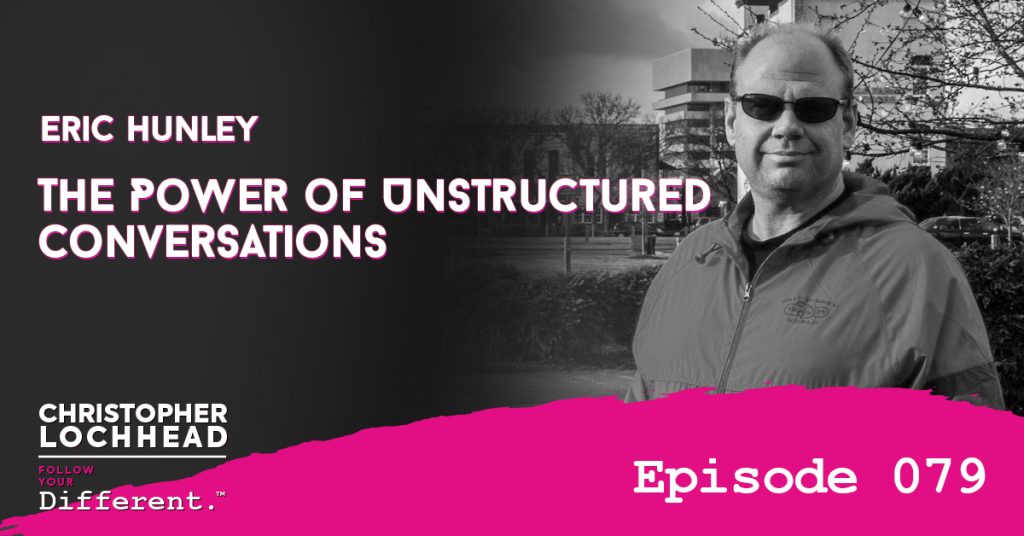
Podcast: Play in new window | Download (Duration: 1:06:20 — 60.9MB) | Embed
Subscribe: Apple Podcasts | Spotify | Pandora | RSS | More
This is a great episode, with a great guy Eric Hunley, a fellow podcaster and host of Unstructured. He shares his learnings and insights from his guests—whose backgrounds range from FBI, military and law enforcement to entrepreneurs, authors, and thinkers.
The Unstructured Podcast
Eric Hunley hosts the podcast Unstructured. Although he is well-known for his unstructured-style interview, he admits that he does a lot of research beforehand. Further, he leads the guest to a path by asking triggering questions.
“By triggering, it’s not to get them upset per se. I wanna know what their passion is, what makes them tick, why they do certain things, I want them to be excited.” – Eric Hunley
Crime and Investigation Podcast Guests
Eric shares some very interesting (and disturbing for some) stories about his guests with a background in military and law enforcement. In particular, his upcoming guest is an ex-FBI agent. He used to handle bombs but then crossed over into the behavioral analysis unit, with a focus on sex crimes.
“He’s gone into a bit about repressed memories and how things can be planted, and things of that sort and cognitive biases and persuasion and influence and things like that, that fits my interests.” – Eric Hunley on his guest at Unstructured
Eric and Christopher shared their common interests with crime and investigation stories. Moreover, they agreed that people have a lurid fascination with monsters—whether fictional or real-life psychopath and serial killers.
“There’s a Southern Californian Daycare, where 300 children were all molested inside tunnels under the schools. Its part of a satanic worship group.” Eric Hunley, as he recounts one of his guest’s stories in his podcast, Unstructured
Dealing with Authors and Entrepreneurs
Eric shares his experiences conversing with authors and entrepreneurs. He admits he has a hard time closing conversations, especially when the guest has a very interesting story. Christopher shares in response to Eric, that there is a natural arc of conversations, even the sh*tty ones.
“Sh*tty conversations are probably when one or both sides have an agenda. Were not into talking points. I am probably, ironically, a little more interviewing than you are, but still conversational.” -Eric Hunley
Both also exchanged their preparation in dealing with authors and entrepreneurs, which is actually reading their books.
When you actually read the book, you can get an insight into their personality or the message, that is deeper. A lot of times they get blown away by insightful questions. If I can, I do get that stuff out early. When the guest knows you care or give a shit about then, then it becomes a conversation. -Eric Hunley
To hear more about unstructured conversations and more relevant information from Eric, download and listen to the episode.
BIO:
“Eric Hunley is forging his path in unstructured interview-style podcasts, as the host of the Unstructured Podcast.
It is no surprise that fellow podcasters follow this formula in podcasting.
The unstructured podcast sources a gambit of unique podcast guests, who are based all around the globe.
Eric Hunley has created well over a hundred interview styled podcasts in less than nine months.
His unrelenting professionalism, detail orientated research, and smooth delivery as a host serves as an inspiration to many.
New podcasters and seasoned professionals often seek out his knowledge and advice when it comes to the business of podcasting.
Eric’s previous experience as an instructor at the University of Arizona has helped cement his reputation as an educator.
His position opened many doors for him and has begun to lead to further speaking opportunities. He often draws on his many years of experience as an athlete, marathon runner, coach, and university lecturer.
Eric Hunley is predominantly self-taught and he understands that his students have the ability to absorb any skill with the right kind of guidance.
As such he is beginning to mentor new podcasters who are looking to get on the fast track so that they can successfully build their podcasting careers.
He has also been developing the systems and frameworks needed to deliver a fully comprehensive interview podcast and fast-tracking the guest research process.
Eric Hunley is the author of three books and is currently working on his fourth book. The book is titled “Interview Podcasting: Find Your Voice and Increase Your Authority.”
You can find a list of shows that feature Eric Hunley’s podcast appearances here.
Eric Hunley is married to Leslie Smail and lives in Hampton, Virginia, USA
Links:
We hope you enjoyed this episode of Follow Your Different™! Christopher loves hearing from his listeners. Feel free to email him, connect on Facebook, Twitter, Instagram and subscribe on iTunes!

